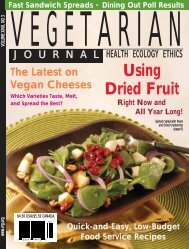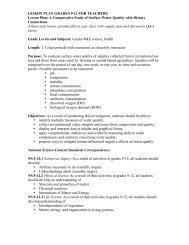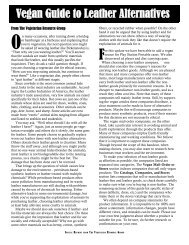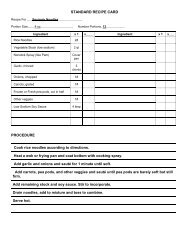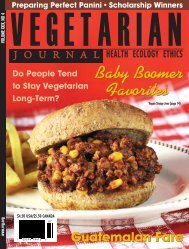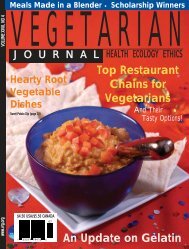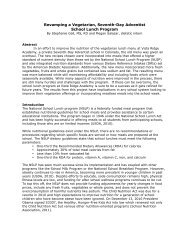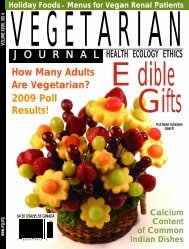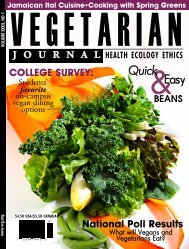Southwestern - The Vegetarian Resource Group
Southwestern - The Vegetarian Resource Group
Southwestern - The Vegetarian Resource Group
- No tags were found...
Create successful ePaper yourself
Turn your PDF publications into a flip-book with our unique Google optimized e-Paper software.
SCIENTIFIC UPDATEBy Reed Mangels,PhD, RD, FADAA REVIEW OF RECENT SCIENTIFIC PAPERS RELATED TO VEGETARIANISMFast Food ConfidentialDuring a recent study, researchers collected 480 samplesof hamburgers and chicken sandwiches from BurgerKing, McDonald’s, and Wendy’s in three locations insix cities. <strong>The</strong> samples were tested using a method thatshows what the animals used to produce these items hadbeen fed. <strong>The</strong> researchers had been told by the suppliersof meat to the fast food chains that they used “localfarms” that fed “mixed grains.” In contrast, all of thechicken and 93 percent of the beef examined came fromanimals that had been fed an exclusively corn-baseddiet. This suggests that the animals had been fed corn,rather than grass or other grains, to rapidly fatten themup prior to slaughter. In addition, relatively high levelsof a form of nitrogen found in samples was said to indicatethat the animals had been confined rather thanoutdoors. While this may not be news to vegetarians,researchers hope that their findings will spark consumers’curiosity about the origins of their food.Jahren AH, Kraft RA. 2008. Carbon and nitrogen stableisotopes in fast food: Signatures of corn and confinement.Proc Nat Acad Sci 105:17,855-60.Gluten-Free Vegan Diet MayLower Bad Cholesterol andReduce Inflammation in Peoplewith Rheumatoid ArthritisRheumatoid arthritis affects more than 1.3 millionadults in the U.S. It is an autoimmune disease, whichmeans that the symptoms are due to a person’s immunesystem attacking his or her own body. Besides joint pain,people with rheumatoid arthritis are also at increasedrisk for heart disease. Swedish researchers studied 66people with rheumatoid arthritis. Thirty-eight of themwere randomly assigned to follow a gluten-free vegandiet for a year, while 28 were assigned to what theinvestigators called a “well-balanced non-vegan diet.”<strong>The</strong> gluten-free diet was based on corn, rice, millet,buckwheat, and sunflower seeds; it did not containwheat and other sources of gluten. Thirty subjects onthe vegan diet and 28 on the non-vegan diet completedat least three months of the study and were included inthe analyses. <strong>The</strong> group on the vegan diet lost significantlymore weight and had reduced levels of LDL (bad)cholesterol. <strong>The</strong>y also had lower levels of an indicatorof inflammation. This study was quite small, so additionalresearch is necessary to corroborate these results.Elkan A-C, Sjoberg B, Kolsrud B, et al. Gluten-freevegan diet induces decreased LDL and oxidizedLDL levels and raised atheroprotective naturalantibodies against phosphorylcholine in patientswith rheumatoid arthritis: a randomized study.Arthritis <strong>The</strong>r 10(2):R34. Epub 2008 Mar 18.Dietary Improvements Seenin People with Type 2 DiabetesFollowing a Lowfat Vegan DietType 2 diabetes affects close to 11 percent of U.S. adultsand costs $174 billion a year in medical costs alone.A lowfat vegan diet has been shown to be part of aneffective treatment for type 2 diabetes (). A recentstudy looked at dietary changes made by participantsfollowing a lowfat vegan diet to treat type 2 diabetes.Ninety-nine men and women with type 2 diabeteswere assigned to either a lowfat vegan diet or a standarddiabetes diet and then studied for 22 weeks. <strong>The</strong>group eating the vegan diet reported higher intakesof carbohydrate, fiber, beta-carotene, and vitamin Ccompared to their pre-study diet. <strong>The</strong> other group hadlower intakes of iron; this was not the case for the vegangroup. Both groups had difficulty meeting recommendationsfor vitamins D and E, calcium, and potassiumand consumed too much sodium. <strong>The</strong> vegan groupincreased their intake of vegetables, fruits, nuts, andsoy protein, while the other group increased theirintake of soy protein and nuts. Both groups decreasedtheir intake of harmful trans fats. <strong>The</strong>se results suggestthat a lowfat vegan diet can lead to a healthier overalldiet in people with type 2 diabetes. Of course, peoplewith diabetes should consult with their health careprovider before making marked dietary changes.28 Issue Two 2009 VEGETARIAN JOURNAL



